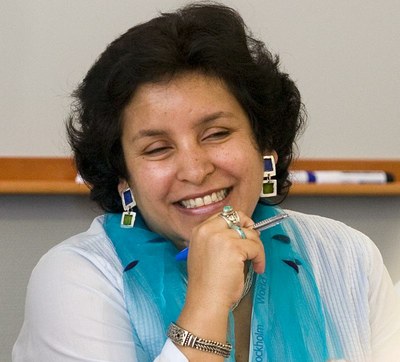Flowing upstream: The challenge of mainstreaming gender in water governance
On 6 September 2007, the Steering Committee of the Gender and Water Alliance elected Sara Ahmed as the new Chairperson of GWA. Here she outlines the challenges ahead.
 I would like to begin by thanking all of you for your messages of support and letting you know how honoured I am to take over the position of GWA Chairperson from Ethne Davey. Ethne has shown us that leadership is not about power or position, but about being inclusive, listening to the voices of the quiet majority and above all being accountable to our members, partners and the larger constituency of poor women, men and children that we serve. Thank you Ethne for helping the GWA build a principled foundation.
I would like to begin by thanking all of you for your messages of support and letting you know how honoured I am to take over the position of GWA Chairperson from Ethne Davey. Ethne has shown us that leadership is not about power or position, but about being inclusive, listening to the voices of the quiet majority and above all being accountable to our members, partners and the larger constituency of poor women, men and children that we serve. Thank you Ethne for helping the GWA build a principled foundation.
Challenges
As the GWA grows in size and scope of work, demonstrating that more equitable and gender-sensitive IWRM is not only possible but desirable, we continue to face several challenges. Let me outline some of these challenges on which I hope our work over the next few years will focus:
- The challenge of understanding gender, and by extension gender mainstreaming, as not simply a question of numbers (women on water committees, for example) but of transforming, indeed setting the agenda for, our water policies bureaucracies and agencies.
- The challenge of access to low-cost and culturally appropriate water and sanitation facilities, particularly for poor women and girls, in rapidly growing urban environments and emerging peri-urban centres.
- The challenge of understanding climate change or variability and what it means for our water resources, food security and for the adaptive strategies of the poor and vulnerable, living in areas prone to increasingly intensive floods, pervasive drought or coastal surges and storms.
- The challenge of HIV/AIDS and how it continues to devastate poor families, women and community water supplies, especially in the African continent.
- The challenge of good water governance which is accountable to poor women and men, ensures transparent decision-making processes and provides genuine space for the powerless to participate, voice their concerns and build empowered and sustainable community institutions.
Broader understanding of diversity and social inclusion
As gender advocates, we work at many institutional levels with a very clear mandate that gender for us is more than simply the social relationships of power between women and men, but also encompasses a broader understanding of diversity and social inclusion. We bring a range of skills and experiences to our strategies on capacity building, knowledge management and policy advocacy, learning from each other in enabling environments that facilitate collaboration and partnerships. However, it is the silent majority around the world, the individuals, households and communities that we work with and to some extent ‘represent’, where I personally feel that the challenge of mainstreaming gender-equitable and sustainable water management lies.
As we move ahead in our goals, the GWA looks for your continuing support, for new and innovative ideas to take forward our agenda and for strengthening both our global and regional processes of water advocacy and community practice.
We hope that you will continue to engage in dialogue with us through our web-site, our listserv or by e-mail.
Thank you for your support.


